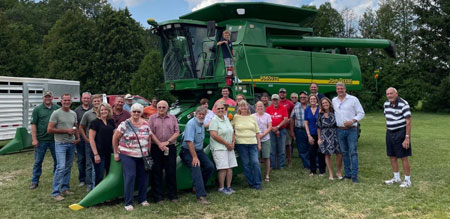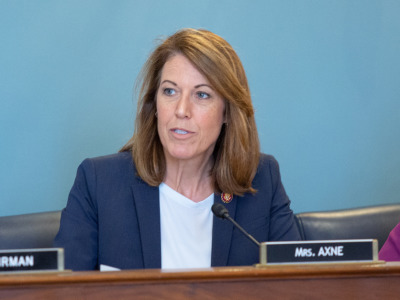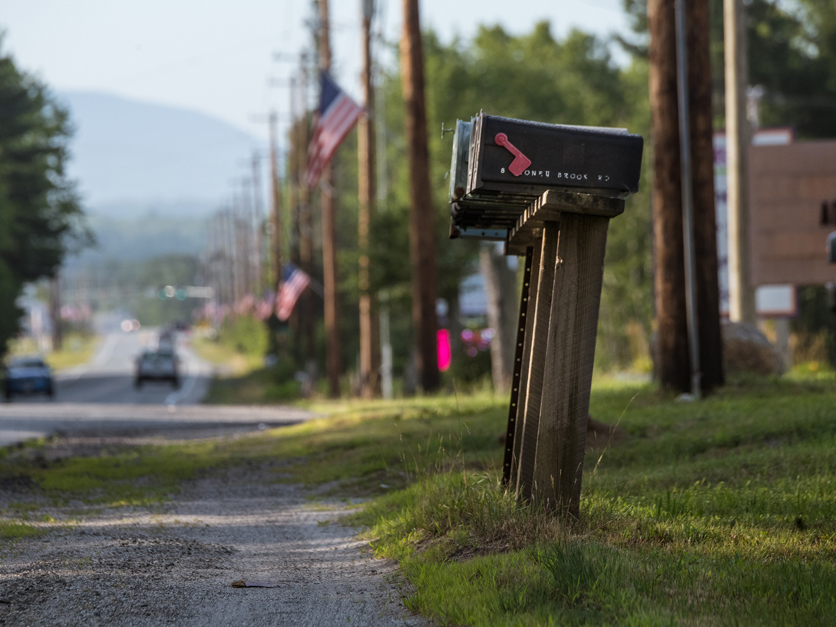Well into the 1990s, rural America was a political battleground. Democrat Bill Clinton won a plurality of the rural vote in that decade. But that is no longer the case, and rural voters are trending so heavily Republican this year that they could play a key role in giving the GOP control of Congress.
Some Democrats are concerned that the party is putting so much focus on issues such as abortion that it’s ignoring the top concerns of rural voters, the biggest of which is inflation, according to a recent poll.
Three-quarters of battleground rural voters say the economy isn’t working for them and half don’t expect their finances to improve in the next year, according to the survey sponsored by the journal Daily Yonder. Forty-five percent of those surveyed cited inflation as their biggest concern, and no issue came close.
“I think they’re going to be voting pretty much Republican,” said poll director Celinda Lake of Lake Research Partners. The Democratic political strategist said her party has failed to engage in a conversation with those in rural America about their values.
Lake said party leaders in Washington are “very, very out of touch with rural America” and added, “I think they’re out of touch honestly with all of America.”
 Celinda Lake, Lake Research Partners
Celinda Lake, Lake Research PartnersThe states polled include Georgia, Michigan, Nevada, North Carolina, Ohio, Pennsylvania and Wisconsin, which are all pivotal to Republican hopes of taking control of the Senate in next week’s elections. Republicans are trying to retain control of seats in states such as Ohio, Pennsylvania and Wisconsin and could potentially flip Democratic seats in Arizona, Georgia and Nevada.
Democrats can retain effective control of the Senate if they retain at least 50 seats, allowing Vice President Kamala Harris to continue breaking ties.
Lake said rural voters will be especially important in Senate and gubernatorial races since those involve an entire state and rural voters could mean the margin of difference.
The rural vote is less crucial in many House races, according to Lake. But Democrats are defending several districts in the Midwest and elsewhere with significant rural populations. At least 11 Democratic seats on the House Agriculture Committee are in play this year.
Some 59% of respondents said they intend to vote for Republicans in congressional races, while 32% said they intend to vote for Democratic candidates. That’s roughly the margin by which former President Donald Trump won the rural battleground states in 2020.
Republicans are generally favored to win the 218 seats needed to control the House, but Democrats hope to at least keep the margin close.
A political analysis site that is generally more favorable to Republicans, RealClear Politics, rates 228 House seats as safe for Republicans or leaning or likely to go to the GOP. Thirty-three more races are considered toss-ups.
Other rating services don't put Republicans in quite as strong a position.
The Cook Political Report and Inside Elections each rate 212 seats as safe, likely or leaning Republican. Cook rates 35 more races as toss-ups, while Inside Elections considers 18 races to be toss-ups.
The website FiveThirtyEight rates 219 seats as safe, likely or leaning Republican and another 11 races as toss-ups. Sabato’s Crystal Ball has 218 seats safe, likely or leaning Republican, with another 22 races as toss-ups.
Amy Walter, editor and publisher of the Cook Political Report with Amy Walter, believes Republicans are likely to win control of the House by at least 20 seats, and that the margin of victory in rural areas will be important in some swing districts that also include urban and suburban voters.
Such districts, many held by House Ag Democrats, include Rep. Abigail Spanberger’s 7th District in Virginia, which includes part of the Washington suburbs; Rep. Cindy Axne’s 3rd District in Iowa, which includes metropolitan Des Moines; and Angie Craig’s 2nd District seat in Minnesota, which includes some of the Twin Cities suburbs.
Walter noted that in the 2021 governor’s race in Virginia, “not only did the rural areas turn out, but they turned out and voted by an even larger margin” than they did in the 2020 presidential election.
A crucial question for House Democrats in districts like that, according to Walter, is how much rural support can they continue to lose and still offset those rural margins with urban and suburban votes.
Are Democrats ignoring rural voters' concerns?
Jeff Bloodworth, co-director of the School of Public Service & Global Affairs and a professor of history at Gannon University located in Erie, Pennsylvania, said Democrats don’t even try to appeal to rural voters, and Republicans take rural voters for granted.
“Rural America holds an extraordinary amount of political power [in] the Senate and in the House. It should be a battleground,” Bloodworth said. “Rural voters are marginalized, and they're ignored,” which he also attributed to why many of those voters offered strong support for Trump.
Patty Judge, former Iowa lieutenant governor and founder of Focus on Rural America, shared that ahead of the 2020 and 2018 elections, there was a lot of talk about rural votes. But that isn't the case in this election. “In my opinion, that’s not a good thing,” Judge said.
“We've got Democrats talking about women's rights, about climate, and about equal opportunity for all. And those are all incredibly important issues. Then we've got Republicans talking about high gas prices, about economic opportunity, high taxes and inflation. And those are all incredibly important. But I’m missing how those things converge,” Judge said.
Former Sen. Heidi Heitkamp, a North Dakota Democrat who founded the One Country Project to help her party better connect with rural voters, said the “conversations in rural America continue to focus on the economy and the resurrection of the job market.”
Bloodworth, who is a registered Democrat but considers himself a moderate, doesn’t think Democrats seriously try to win rural areas, but he thinks that could change after this election.
“Rural voters are sending a message. They’re tilting the playing field towards the GOP,” he said. “In a way they’re demonstrating their power, and maybe there’ll be some sort of reaction from the Left.”
In Ohio, Democratic candidate does try to appeal to rural voters
One Democratic candidate who is making a serious effort to win in rural areas may be Rep. Tim Ryan, who is running against Republican J.D. Vance for the Senate seat now held by retiring GOP Sen. Rob Portman. Vance is backed by former President Donald Trump.
Chris Gibbs, a farmer who is president of Rural Voices USA, became an independent in 2018 after 20 years of Republican Party leadership at the local level. But he didn’t become a registered Democrat, he said, until he saw Ryan’s focus on rural voters.
Ryan went to Gibb’s farm near Maplewood, Ohio, and visited with nearly 35 farmers Gibbs gathered together that day. Nearly 80% of those producers would not consider themselves Democrats, and Ryan sat down in a lawn chair for 75 minutes to listen to them firsthand.
He opened up with just five minutes of talking about himself. “He never said the word 'J.D. Vance.' Never said the word 'Republican.' Never said the word 'Democrat,'” Gibbs said. Instead, Ryan explained to those in attendance that he’s not from an agricultural district and asked for their insight.
“The group truly sensed that he was interested in them and wanted to know about their concerns,” Gibbs said.
Gibbs said most telling of that day was when Ryan’s wife asked for a photo with all those in attendance — comprised of many traditional Republicans — and none chose to miss out on the chance to get pictured with him.
 Tim Ryan poses with Ohio farmers following a conversation about ag issues.
Tim Ryan poses with Ohio farmers following a conversation about ag issues.“What that told me was that people were looking for someone genuine. And not spoken to or told what he was going to do when he got to Congress and not told everything that was wrong with America,” Gibbs said.
Still, the Ohio Farm Bureau Federation ended up giving its endorsement to Vance. Bill Patterson, the group's president, shared that after interviewing and hearing from both candidates, the farmer leaders felt that Vance would best represent Ohio agriculture.
“As you think about regulations we face and think about the struggles as far as pricing and inputs, he’s certainly more aligned with where we’re at,” Patterson said.
Patterson said the more he heard from Vance, the more he liked him. “He was a little late to the race. A lot of people didn’t know him or know what he was about and what he was going to do.”
Patterson said he’s hearing not a lot is being done to get turnout from the urban vote. “This makes it that much more important rural Ohio gets out there and supports those individuals who understand our issues,” Patterson said.
Vulnerable House Dems bank on abortion issue
Here is a look at some of the most vulnerable members of the House Agriculture Committee, based on assessments by the five rating services, Cook Political Report, FiveThirtyEight, Inside Elections, RealClearPolitics and Sabato's Crystal Ball:
Spanberger, Democrat, Virginia's 7th District — Three of five rating services list the race as leaning or tilting Democratic, while two rate it as a tossup. Spanberger, who chairs the House Ag subcommittee that oversees conservation programs, is running against Yesli Vega, a veteran law enforcement officer. Like many Democrats, she’s attacking Vega over the abortion issue, which could help the incumbent with the new district’s suburban voters.
Interested in more coverage and insights? Receive a free month of Agri-Pulse!
Jahana Hayes, Democrat, Connecticut's 5th District — Three of five services rate it as lean Democratic and two as toss-ups. She’s also sought to make abortion rights a major issue in her race against Republican George Logan. Republicans argue that inflation and crime are bigger concerns to voters, according to the Connecticut Mirror.
Tom O’Halleran, Democrat, Arizona's 2nd District — O’Halleran, co-chair of the Blue Dog Coalition, is expected to lose his race to former Navy SEAL Eli Crane; all five services rate the race as lean or likely Republican. O’Halleran currently represents the 1st District and switched to run in the 2nd District as a result of redistricting, but the 2nd District also leans Republican.
Sean Patrick Maloney, Democrat, New York's 17th District — He’s also running in a new district; the redrawn 17th takes in rural areas north of New York City. Three of five rating services see the race with Republican political strategist Michael Lawler as leaning toward Maloney, while two rate it as a tossup.
Angie Craig, Democrat, Minnesota's 2nd District — She’s in a rematch with Tyler Kistner, who she defeated in 2020; three of five services consider the race a tossup. She’s tried to make abortion rights an issue and has touted her support for the Inflation Reduction Act, the Democratic package of climate and health care spending enacted in August.
Cindy Axne, Democrat, Iowa's 3rd District — Four of five services rate this race as leaning or likely Republican. She faces Republican state Sen. Zach Nunn, who hails from a Des Moines suburb and may be able to cut into her metro support. Judge, who lives in Axne’s district, says the race is “razor thin.”
 Rep. Cindy Axne, D-Iowa
Rep. Cindy Axne, D-IowaKim Schrier, Democrat, Washington's 8th District — The rating services are all over the map on this race, rating it anywhere from “Likely D” to “Lean R.” Schrier and her supporters also are putting a focus on abortion rights, but she told the Washington Post recently that inflation and crime also are major concerns.
Sanford Bishop, Democrat, Georgia's 2nd District — Bishop got on the House Ag Committee during this Congress, but his more influential post is as chairman of the House Agriculture Appropriations Subcommittee, which writes the annual spending bills for the Agriculture Department, Food and Drug Administration and Commodity Futures Trading Commission. Bishop is expected to prevail against GOP attorney Chris West. Three of the five rating services rank the race as "Likely D" and Inside Elections sees it as "solid D."
Marcy Kaptur, Democrat, Ohio's 9th District — Like Ryan, Kaptur has also made an effort to reach out to rural voters in her redrawn district, hosting a House Ag listening session in August. Her GOP challenger is J.R. Majewski, who The Associated Press reported in September had misrepresented his military and business experience. Analysts see the race moving in Kaptur’s favor.
Sharice Davids, Democrat, Kansas' 3rd District — Davids is counting on support in the Kansas City suburbs to propel her to reelection, and she is generally favored to defeat Republican Amanda Adkins.
Don Bacon, Republican, Nebraska's 2nd District — This metro Omaha district is nearly always close, but Bacon is favored to beat Democratic challenger Tony Vargas.
Mayra Flores, Republican, Texas' 34th District — She won the seat in a special election earlier this year to replace the retiring Democratic Rep. Filemon Vela. Now, she faces Democratic Rep. Vincente Gonzalez, who currently represents the 15th District. Most analysts rate the race as a tossup.
In addition to Bishop, three other members of the House Agriculture Appropriations Subcommittee are in tight races as well.
Henry Cuellar, Democrat, Texas' 28th District — Cuellar, arguably the most conservative Democrat left in Congress, is slightly favored in the south Texas district to defeat Republican Cassy Garcia, a former aide to Texas GOP Sen. Ted Cruz. Cuellar’s trying to straddle the abortion issue. He voted against a bill that would have legalized it nationwide but also criticized Texas’ tight restrictions.
David Valadao, Republican, California's 22nd District — Valadao has been defeated once before, and the race is widely viewed as a tossup. Challenging Valadao is state Assembly member Rudy Salas. Valadao has put a focus on water issues. As of Oct. 20, more money had been spent on advertising in that race than in any other House district, the Wesleyan Media Project reported.
Ashley Hinson, Republican, Iowa's 2nd District — Hinson, who was hospitalized in October for a kidney infection, is favored against Democratic state Sen. Liz Mathis. Climate policy came up during a debate in August: “What we do is we focus on precision agriculture and conservation practices,” Hinson said.
For more news, go to Agri-Pulse.com.



